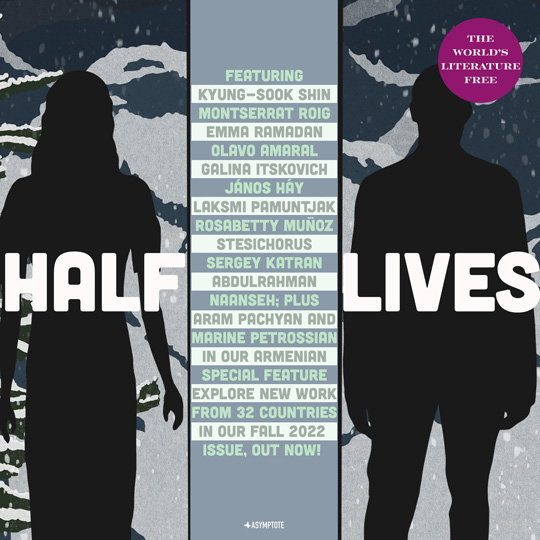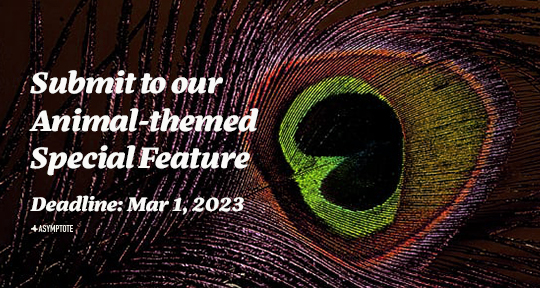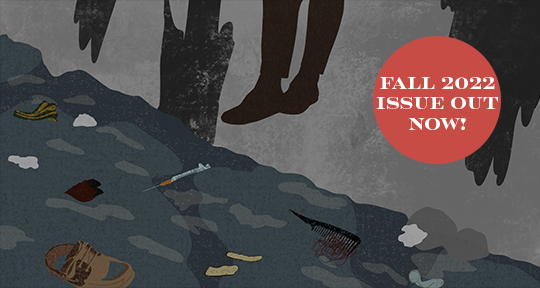Welcome to “Half-Lives,” our new Fall 2022 issue, where never-before-published work from 32 countries and 19 languages confront life as it shouldn’t be: stunted, degraded, perversely foreshortened—in short, half-lived. Its centerpiece is the Armenian Special Feature, generously sponsored by the Calouste Gulbenkian Foundation, under the aegis of which we are proud to present stunning new translations of emerging authors such as Aram Pachyan, last year’s winner of the EU Prize for Literature—Armenia’s first recipient!—alongside more established voices like Narine Abgaryan, Krikor Beledian, and Hrant Matevossian. Inescapably harrowing because of their historical contexts, many of these works set the tone for the rest of the issue—including a gritty dispatch from Ukraine via Galina Itskovich and a spotlight on Ukraine-born artist Sergey Katran. Elsewhere, Claire Mullen chats to Emma Ramadan about the joy of translating from the archive, past contributor Anton Hur brings us a new short story by 2012 Man Asia Literary Prize recipient Kyung-Sook Shin, and Grant Schutzman delivers our first work from Mozambique in the form of moving poetry by Álvaro Fausto Taruma. All of this is illustrated by our amazingly talented guest artist, the London-born creative Louise Bassou.
On the heels of Roe being overturned, our editors have also responded by centering one half of the human condition in this issue. Pregnancy is the subject of Lusine Kharatyan’s keenly observed #America_place Pregnant and S. Vijayalakshmi’s intimately recounted Just Like a Womb. Growing up (a “difficult art” according to a very wise Montserrat Roig in this issue’s inspiring Brave New World Literature Feature), the women in these pieces are made to feel less than human in contradictory ways, shamed for the developing bodies in which they are trapped (Rosabetty Muñoz) while becoming objects of unwanted desire at the same time (Eszter T. Molnár). In Mexico, Karen Villeda reminds us that the consequences of being a woman can be fatal, writing that women are not alive, but only “still alive” until they are not. How do women counteract the stunting forces of a hostile world? From the ventriloquism of an Abuela who talks to herself to ensure that no one else speaks for her in Alejandra Eme Vázquez’s You’ll Leave Your Body Behind to the adoption of a third language by Jhumpa Lahiri to develop her own linguaggio, as revealed in Translating Myself and Others reviewed by Caterina Domeneghini, giving voice to female experience, as we endeavor to do in this issue, is one shared mode of resistance.

No matter your taste, there’s something for everyone in this edition, so circulate this glorious new issue by printing our Fall 2022 flyer (downloadable here); like and share our issue announcement and article plugs on Facebook, Instagram, and Twitter.
To read the world and read it more fully is itself a recipe for a fuller existence. If we’ve made a difference in that regard to your lives, please consider celebrating our full twelve years of publishing the best in world literature by joining us a masthead or sustaining member from as little as $5 a month—for a limited period only, we’ll even throw in a bonus 2023 digital Asymptote calendar!
READ THE NEW ISSUE



